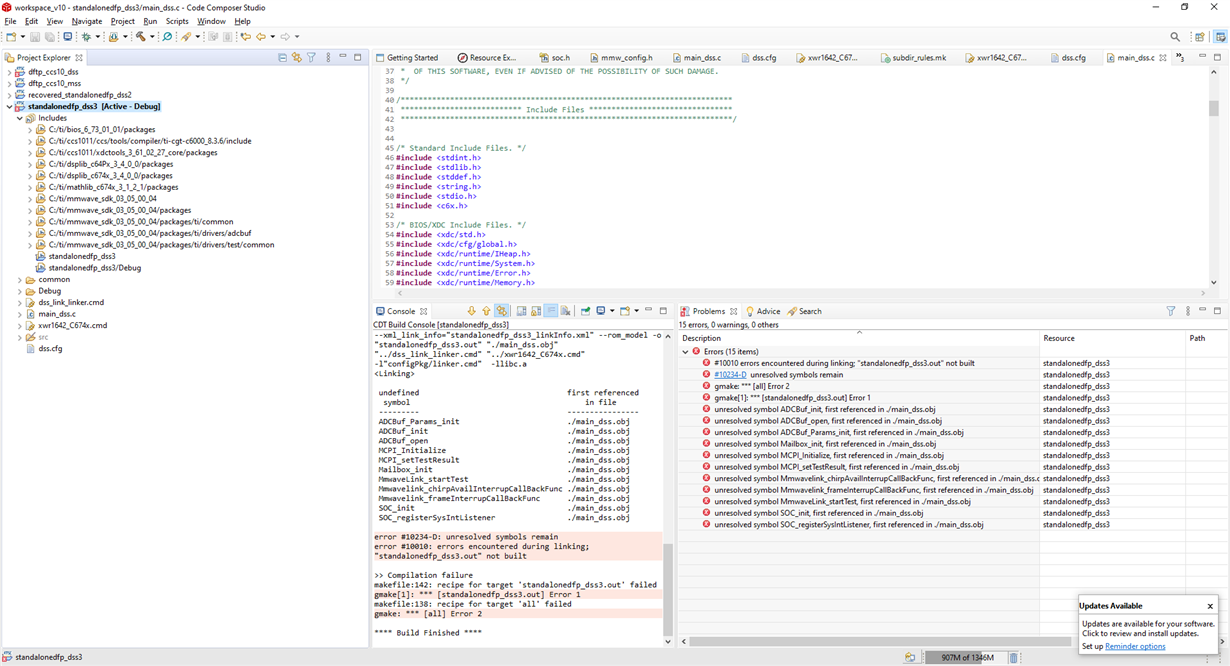Other Parts Discussed in Thread: UNIFLASH, DCA1000EVM
Dear Texas Instruments Representatives
I am trying to create a Code Composer Studio (CCSV10) project using the mmWave SDK 3_05_00_04 based on the sample test code given for the mmwavelink new reconfiguration interface in "C:\ti\mmwave_sdk_03_05_00_04\packages\ti\control\mmwavelink\test\xwr16xx". I have created a new project, imported the files in the CCS IDE and added the corresponding Compiler and Linker flags in the project:
Compiler Flags:
-mv6740 --abi=eabi -O3 --include_path="C:/ti/mmwave_sdk_03_05_00_04/packages" --include_path="C:/ti/mmwave_sdk_03_05_00_04/packages/ti/drivers/test/common" --include_path="C:/ti/mmwave_sdk_03_05_00_04/packages/ti/drivers/adcbuf" --include_path="C:/ti/mmwave_sdk_03_05_00_04/packages/ti/common" --include_path="C:/ti/mmwave_sdk_03_05_00_04" --include_path="C:/Users/hagon/workspace_v10/standalonedfp_dss3" --include_path="C:/ti/ccs1011/ccs/tools/compiler/ti-cgt-c6000_8.3.6/include" --define=SOC_XWR16XX --define=SUBSYS_DSS --define=DOWNLOAD_FROM_CCS --define=DebugP_ASSERT_ENABLED -g --gcc --diag_warning=225 --diag_wrap=off --display_error_number --gen_func_subsections=on
Linker Flags:
-mv6740 --abi=eabi -O3 --define=SOC_XWR16XX --define=SUBSYS_DSS --define=DOWNLOAD_FROM_CCS --define=DebugP_ASSERT_ENABLED -g --gcc --diag_warning=225 --diag_wrap=off --display_error_number --gen_func_subsections=on -z -m"standalonedfp_dss3.map" --heap_size=0x800 --stack_size=0x800 -i"C:/ti/ccs1011/ccs/tools/compiler/ti-cgt-c6000_8.3.6/lib" -i"C:/ti/mmwave_sdk_03_05_00_04/packages/ti/control/mmwave/lib" -i"C:/ti/mmwave_sdk_03_05_00_04/packages/ti/control/mmwavelink/lib" -i"C:/ti/mmwave_sdk_03_05_00_04/packages/ti/alg/mmwavelib/lib" -i"C:/ti/mmwave_sdk_03_05_00_04/packages/ti/drivers/crc/lib" -i"C:/ti/mmwave_sdk_03_05_00_04/packages/ti/drivers/mailbox/lib" -i"C:/ti/mmwave_sdk_03_05_00_04/packages/ti/drivers/soc/lib" -i"C:/ti/mmwave_sdk_03_05_00_04/packages/ti/drivers/osal/lib" -i"C:/ti/mmwave_sdk_03_05_00_04/packages/ti/drivers/edma/lib" -i"\"C:/ti/mmwave_sdk_03_05_00_04/packages/ti/drivers/adcbuf/lib\"" -i"C:/ti/ccs1011/ccs/tools/compiler/ti-cgt-c6000_8.3.6/include" --reread_libs --diag_wrap=off --display_error_number --warn_sections --xml_link_info="standalonedfp_dss3_linkInfo.xml" --rom_model
I created two projects, one for the DSS and one for the MSS. However, I haven't even managed to compile the DSS project. It seems to finish the initial compilation but it fails during the linking process. It seems the ADCBuf_init library is somehow not seen by the linker. This is the screenshot of the errors after the linker fails:
Could you please give me any suggestion of how to solve these errors or how to use that mmwavelink test sample code?
There was some other similar post having the same errors I'm showing, but the solution reported there has broken links on the System variables that were modified to solve the problem, so I can't know what was the solution: https://e2e.ti.com/support/sensors/f/1023/t/947634?IWR1443-MMWAVE-SDK-DEVICE-cannot-be-resolved-CCS-9-


